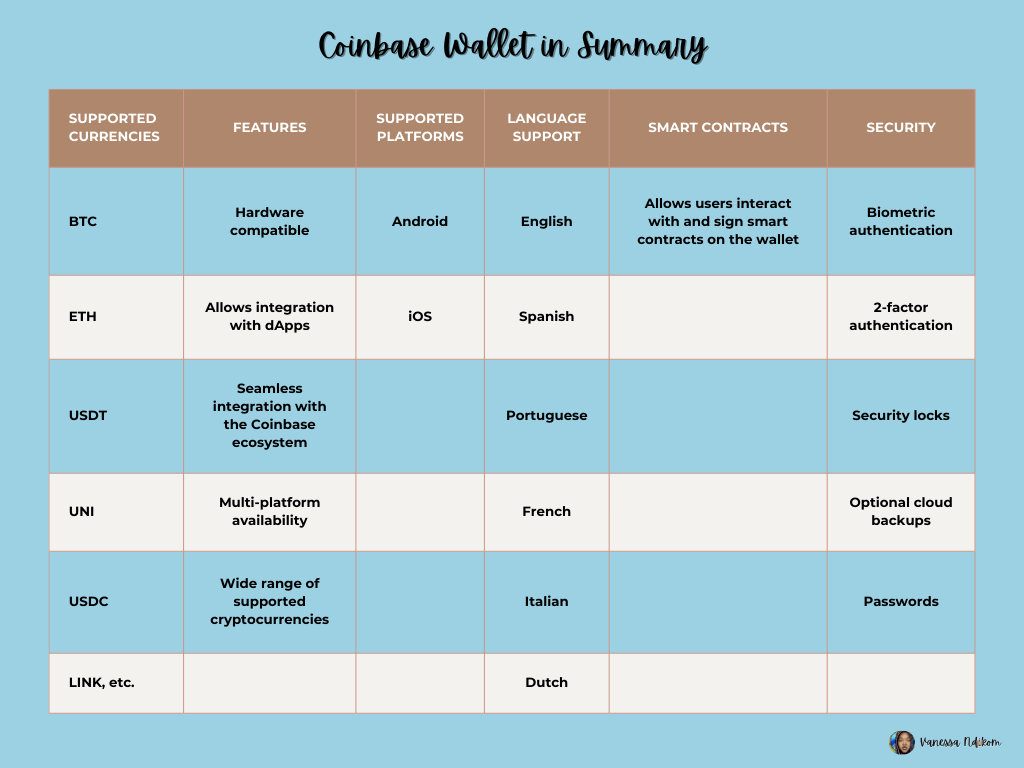Today, there are over 60,000 wallets that make financial transactions on-chain secure, transparent and speedy, but what wallet would you choose as a Base user?
To help, I’ve curated a list of the best 5 wallets to help you protect and store your crypto on Base network – now you have fewer wallets to choose from.
SIDE NOTE
-
Base is an Ethereum-based Layer-2 network developed by Coinbase. It operates using Optimism’s OP Stack to improve transaction speeds, reduce costs and maintain security on the network.
-
A Layer-2 network is built on an existing Layer-1 network to improve its scalability and efficiency. It handles some of the computational workload for the mainnet (Layer-1 network), allowing for faster transaction speeds and lower costs.
Now, let’s have a look:
Coinbase

Coinbase Wallet is a self-custodial crypto wallet that allows users to store their crypto assets, explore the decentralized web with a dApp browser, and interact with various DeFi apps.
It shouldn’t be confused with Coinbase, which is a custodial crypto exchange – although both are owned by the same company.
Here’s a summary of this wallet:

Trust Wallet

Trust Wallet is a secure, self-custody wallet that allows you to buy, sell, and swap cryptocurrencies, collect and trade Non-Fungible Tokens (NFTs), and explore thousands of options on Ethereum and the Binance Smart Chain (BNB) ecosystem.
Here’s a summary of this wallet:

MetaMask

MetaMask is a cryptocurrency wallet and gateway to blockchain applications that allows you to store crypto assets and NFTs built on Ethereum and EVM-compatible blockchains. It’s available as a browser plugin and a mobile app — allowing you to interact with decentralised applications built on Ethereum.
Here’s a summary of this wallet:

Ledger

Ledger is a company that produces secure, multicurrency hardware wallets that protect and store your crypto’s private keys offline. Ledger offers four hardware wallets: Ledger Flex, Ledger Nano X, Ledger Nano S Plus, and Ledger Stax. Unlike online or software wallets, which are always connected to the internet and thus vulnerable to cyber threats, Ledger Wallets function offline, offering more security to users' private keys and crypto assets.
Here’s a summary of this wallet:

Zerion

Zerion is a multi-chain, non-custodial cryptocurrency wallet that allows users to trade and manage their crypto assets (including NFTs and tokens) and interact with various decentralized finance (DeFi) protocols across multiple blockchain networks all from a single wallet. It’s available for mobile, desktop, and tablet and also offers hardware support.
Here’s a summary of this wallet:

Security protocols, ease of use, wallet features, fees, multi-blockchain compatibility, and the availability of customer support are key players in choosing a wallet to store your crypto assets on Base network.
Now that you have this breakdown, the choice is yours to make based on the factors that matter most to you. While the wallet you choose now isn’t final, it will still play a significant role in helping you navigate the Base ecosystem and DeFi space in general.
Thanks for reading! 🤎
